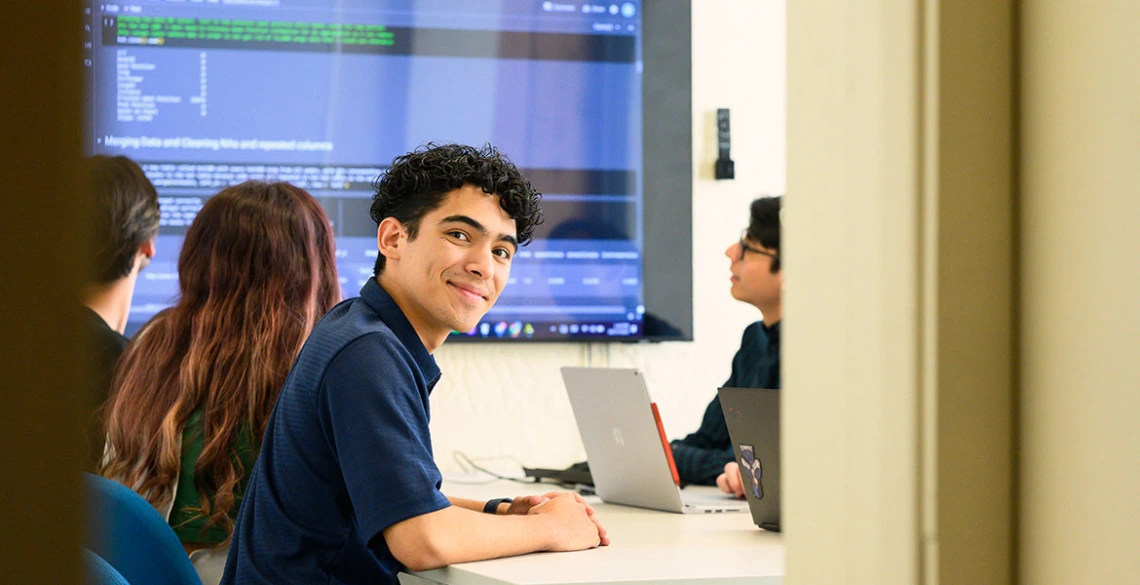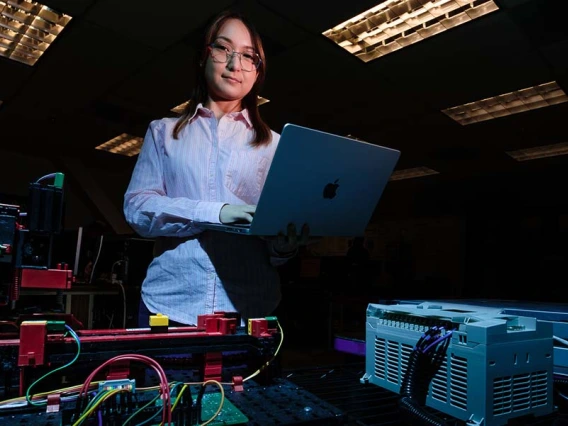Latest graduate degrees cater to in-demand skills
University of Arizona programs in computer science and engineering and software engineering ‘accelerate moving up the technical ladder.’

The college’s Software Engineering Wildcats club is an avenue for career preparation and networking, offering coding workshops, career fairs and social events for students at all levels.
The College of Engineering has added postgraduate degrees to its undergraduate programs in computer science and engineering and software engineering to help fill workforce gaps and accelerate careers. Demand for computer science and software engineers is sky-high, with starting salaries between $65,000 to $125,000.
In fall 2024, the Department of Electrical and Computer Engineering launched master’s and PhD programs in computer science and engineering. And, systems and industrial engineering – after rolling out master’s and accelerated master’s options in January 2024 – began a PhD program in software engineering.
As a founding faculty member of the software engineering program, professor of practice Sharon ONeal led the college’s approval process with the University of Arizona and the Arizona Board of Regents.
“A graduate degree expands and enhances the undergraduate’s technical foundation and work experience,” said ONeal, who instructs software engineering students at all levels. “It’s a critical credential that can accelerate moving up the technical ladder more quickly.”
Investing in computer science and engineering
ECE began offering computer science and engineering BS degrees in fall 2023 to meet industry demand. Employers do not have qualified candidates to fill about 1 million computer science-related jobs, according to the U.S. Bureau of Labor Statistics.
“We’re thrilled to expand the program. Offering graduate degrees is a major benefit for students and employers in every sector,” said Michael Wu, ECE department head. “The department is also pleased to invest in the future by bringing in new hires to join our already excellent faculty.”
The department hired five instructors – Jyotikrishna Dass, Bo Liu, Jesus Ubaldo Quevedo-Torrero, Han Xu and Huanrui Yang – who are experts in areas such as artificial intelligence, hardware design and natural language processing.
The college’s dedication to teaching in-demand skills and subjects – such as programming and algorithm design, operating systems, networking and AI – drew assistant professor Yang to the university.
“Being in the ECE department, students can also engage in hardware and system-related topics, such as building chips and robots. Furthermore, the math and engineering skills enable students to join other technical sectors, like quant trading and data analytics,” Yang said.
Doctoral student Dongwei Wang began studies in August and is set to do research with Yang.
“He has done sound work in AI, and I believe I can learn a lot from him,” said Wang, who plans to teach after graduating.
Expanding software engineering’s reach
The software engineering BS program began three years ago and has grown quickly to serve hundreds of students on campus, online and at the university’s Yuma campus. In addition to main campus enrollment, the SIE department launched online MS and PhD programs at the start of the fall 2024 semester, plus an accelerated master’s at Yuma.
The U.S. Bureau of Labor Statistics projects software engineer employment will grow by 17% from 2023 to 2033, much faster than the average 4% job growth.
“We now offer every level of degree for students at diverse stages and in many circumstances. Software engineering is the only engineering program in which students can earn a PhD online,” said SIE Department Head Ricardo Valerdi. “We’re making a software engineering career accessible to a much larger population.”
The online programs are a nice fit for working students, said ONeal. She’s found that many of the 40 master’s and doctoral students bring work experience valuable not only to them but also to undergraduate software engineering students. Most core courses are dual enrollment, and the classes require team projects. Within the teams, the master’s students become mentors to the undergraduates.
“Their knowledge enhances the entire experience, including in the classroom. The graduate students weigh in with practical experience,” ONeal said.
Students seek advanced degrees for a variety of reasons. Some have degrees in related fields but need specific training to become software engineers. Others are working toward positions that require a master’s degree, such as an engineering fellow job within a company, or a PhD to become a tenure-track university professor or develop advanced commercial technologies.
“The additional training elevates them. It helps accelerate career goals, and most alumni with master’s degrees garner higher salaries,” said ONeal.
A graduate degree also differentiates a candidate in the job market because it demonstrates their willingness to keep advancing knowledge and skills, she said.
“Engineers must commit themselves to lifelong learning because technology changes so quickly.”



